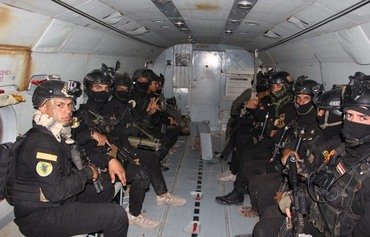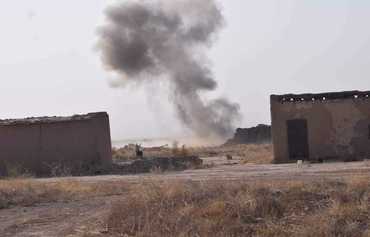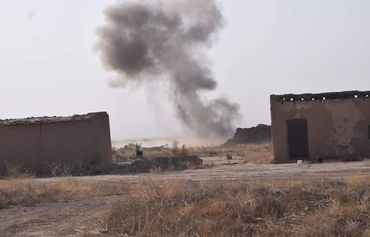Iraqi officials have called for security to be strengthened in remote areas of the country so displaced residents can return to their homes.
Many displaced residents are still fearful of returning to their homes in outlying areas as security forces are not stationed near their villages, which they say makes them easy prey for "Islamic State State of Iraq and Syria" (ISIS) attacks.
Hatra district mayor Ali Saleh al-Ahmadi told Diyaruna that more than 20 remote villages in the southern part of his Ninawa district remain deserted.
But he pointed out that displaced residents have returned to the villages of al-Sheikhan and al-Sheikha, which are situated on the edge of Hatra in areas "within control of the security forces".
![Diyala police commander Maj. Gen. Hamid Khalil al-Shimmari attends the funeral of a soldier killed in an ISIS attack in northern al-Muqdadiya on March 7th. [Photo courtesy of Diyala police media office]](/cnmi_di/images/2020/11/04/26805-forces-tribes-ninawa-600_384.jpg)
Diyala police commander Maj. Gen. Hamid Khalil al-Shimmari attends the funeral of a soldier killed in an ISIS attack in northern al-Muqdadiya on March 7th. [Photo courtesy of Diyala police media office]
Some of these villages had been deserted for many years, he said, especially those located between Hatra Island and Anbar province's Rawa district.
ISIS remnants have been completely purged from the southern area of Hatra, known as al-Jazeera, he said, and there have been constant security operations supported by drone surveillance, al-Ahmadi said.
"There are no forces stationed there, however, that can permanently hold the land, and this prevents the villagers from returning," he cautioned.
The small scattered villages on the island and their distance from each other makes it difficult for security forces to intervene quickly enough to defend the people in the event that they are threatened or attacked, he said.
Call to close 'secret corridors'
"We call for the deployment of units from two or three military divisions to establish fixed security points and conduct intensive patrols on the island to enhance security and close all loopholes and secret corridors," al-Ahmadi said.
Since the most recent attack -- staged by ISIS remnants on the village of Khirbet Hammad about four months ago -- there have been no further security breaches in the city of Hatra or the villages in the north of the district, he said.
This is not the case in remote villages in eastern Iraq, however, particularly those between Diyala and Salaheddine provinces, where ISIS remnants continue to threaten the returning population.
Abdul-Jabbar al-Obaidi, director of Diyala's al-Azim sub-district, told Diyaruna that about 10 families living in the village of al-Hitawiyin were forced to flee following an ISIS attack on their village about a month ago.
Four civilians were killed in the attack.
In the aftermath of this incident, Iraqi forces deployed to protect the village and other remote villages and towns to the west of al-Azim, as part of their Salaheddine operations, including al-Maita and al-Mutaybija.
There also has been an intense push to secure the villages in the east of the district and in the vicinity of the town of Jalawla and the outskirts of Khanaqin district, following terrorist attacks on remote villages, al-Obaidi said.
These included the October 27th killing of five civilians in al-Khailaniya village in al-Muqdadiya district.
Tighter security in remote areas
In light of these incidents, al-Obaidi proposed tightening security, taking preventive measures and strengthening co-operation between residents and security forces, in addition to increasing military deployment in remote areas.
He also called on tribesmen to support Iraqi forces in protecting their areas.
He noted that it is critical to improve security as it is in the interests of ISIS remnants to keep rural villages empty so they can move freely in these areas and establish launchpads for their attacks.
Security forces control the centre of al-Hawija district in western Kirkuk and surrounding areas such as al-Rashad, al-Abbasi and al-Riyadh, local council head Sheikh Naji al-Hawwas told Diyaruna.
"Our territory has been free of terrorist attacks for some time now," he said. "Conditions are stable and most of the district's residents who were displaced have returned to their villages and towns and go about their lives normally."
That said, he added, "we need more forces to reinforce security in the outskirts of the district, especially the areas adjacent to the districts of Makhmour, al-Sharqat and the Hamreen mountains, where ISIS is active".
The information al-Hawija residents have provided to the security forces has helped them thwart a number of terror attacks in al-Zab and al-Abbassi regions, and even in the city of Kirkuk, al-Hawwas said.
This civilian support is critical to security, he said, and also has led to the dismantling of ISIS cells in Daquq and al-Rashad.

![Tribal dignitaries and officials in Ninawa province's Hatra district meet with military leaders to discuss strengthening security in their areas on February 9th. [Photo courtesy of Iraqi Ministry of Defence]](/cnmi_di/images/2020/11/04/26804-tribes-ninawa-iraq-600_384.jpg)






